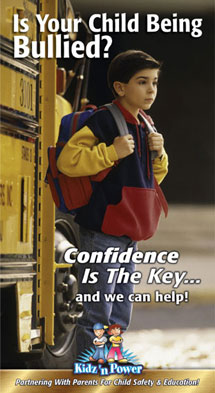
Put an End to School Yard Bullies –
Part TWO
By Shei Franco
Making It Stop
The big question is how to handle bullies. Parents worry that stepping in may deprive their children of opportunities to work things out on their own, but staying out may cause their child more pain.
“There are many solutions to this problem which can actually strengthen and empower children without contributing to further abuse,” says Kate Cohen-Posey, author of How to Handle Bullies, Teasers, and Other Meanies (Rainbow Books, 1995). “It is an opportunity for parents to help children think out the many choices they have.”
For many parents, the first response is to reprimand the bully. Others confront the offender's parents. Still others head straight for the principal's office. All of these are correct approaches, just not necessarily in that order.
The First Step Seems Obvious
“You talk to your child to see what he or she wants to do about the bullying situation,” says Brien O'Callaghan, a clinical psychologist and marriage and family counselor, in Bethel, Conn. “Your child may have already handled it or, in response to what I call ‘parenting by questions,’ he or she may come up with his [or her] own ideas.”
When a child does ask to handle the situation on his or her own, O'Callaghan says it is important to give that space. He suggests telling the child, “I'll give you time to figure this out if you choose, but if it happens again, I'm going to get involved."”
If a parent does get involved, O'Callaghan suggests the next step be contacting the school and applying pressure until an adequate solution is in place.
“The school may have to bring in an expert on bullying and school safety and may have to be pressured to do so,” he says.
In the unfortunate event that help from the school does not rectify the situation, the third step would be a non–blaming conversation with the aggressor's parents. If all else fails, O'Callaghan suggests reporting the incident to the police.
In the end, parents should keep in mind that professional intervention may not always be the best answer.
“The bully will have little interest in listening to a lecture from a professional,” O'Callaghan says. “The victim primarily needs the bullying to stop. Neither child needs a professional therapist. They need a professional bully–stopper.”
How does a parent become a
“professional bully–stopper?”
O'Callaghan offers these tips:
- Pay close attention to the interactions of children in your care.
- Develop a close relationship with all children in your care so that they will be honest with you.
- Ask direct questions of children regarding their experience of safety in all settings.
- Intervene forcefully in incidents of child–child conflict either observed or reported. This intervention involves a brief or extended investigation, an adult judgment of guilt or innocence and an assignment of punishment to the offender.
- Most important, every incident of bullying should be mediated principally through the parents of the children involved, not other authorities like teachers, social service agencies, therapists or police. The parents are those most responsible for the child's behavior and it is of primary importance that they accept responsibility for their children and be capable of parenting with a balanced measure of both love and discipline.
- As an additional alternative, look for a program to empower your children to stand up for themselves and present an attitude of confidence when confronted. A professional martial arts or specialized self–defense/bully proof program can be just the answer to “stopping the bullies!”


